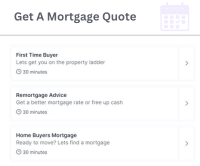moving home mortgage
Mortgage advice to get you moving
Dreaming of a new home? Whether you're expanding, downsizing, or simply looking for a fresh start, we're here to help you find the right mortgage.
- Rated as excellent
- 4.98/5
YOUR HOME OR PROPERTY MAY BE REPOSSESSED IF YOU DO NOT KEEP UP REPAYMENTS ON YOUR MORTGAGE.
home buyers mortgage
Why choose us
Focus on the excitement of moving into your next home and let us handle the mortgage search, application, and everything in between.
Save Time
Don’t waste your valuable time researching mortgage rates and completing lengthy application forms. We’ll take care of it for you.
Save Money
Save money on your mortgage with better rates and lower application fees, it could mean big savings on your monthly payments.
Get Exclusive Rates
Your mortgage adviser has access to 1000’s of mortgage rates and exclusive offers that that may not be available to you directly.
Confused about mortgages
Which mortgage is best?
From the initial deposit to securing the right interest rate, it's easy to feel overwhelmed. Let's break down some essential steps to help you navigate this exciting journey.
Fixed-rate mortgages
When you get a fixed-rate mortgage, your monthly payments will remain the same no matter what happens with interest rates. There are various fixed-rate periods, including 2, 3, and 5 years.
Tracker mortgages
As the Bank of England’s Base Rate rises or falls, tracker mortgages follow it. An agreed margin is added to the Bank of England’s Base Rate to calculate the interest rate. A ‘lifetime’ tracker is for the life of the mortgage, and a ‘term’ tracker is for a period of two or three years.
Standard variable rate mortgages
A SVR is the rate of interest charged once a fixed rate or term tracker period ends. Instead of switching to a SVR, you can usually move to another fixed or tracker product..
A mortgage commonly comes with two payment options, capital repayment and interest-only. It is imperative to carefully consider these options.
What is a capital repayment mortgage?
A capital repayment mortgage includes both capital repayments and interest payments each month. If you use this repayment method, your mortgage will be fully repaid at the end of the term.
What is an interest-only mortgage?
When you have an interest-only mortgage, your monthly payment covers only the interest on your loan, so your capital debt doesn’t decrease over time. Lenders will want to see evidence that you will be able to repay the debt in the future. Buying to let is often done with an interest-only mortgage.
Mortgage porting is a process where you transfer your existing mortgage from your current home to a new property. This can be a more cost-effective option compared to taking out a new mortgage, as you may avoid paying upfront fees such as arrangement fees or valuation costs.
Here’s how it generally works:
Eligibility: You need to check with your current lender if your mortgage is portable. This often depends on the terms of your original mortgage agreement.
Valuation: Your new property will need to be valued to ensure it meets your lender’s criteria.
Transfer: If both properties meet the requirements, your lender will transfer your existing mortgage to the new property
Affording a mortgage
Buying your next home

Find a mortgage
Book a no obligation chat today if you need further assistance to find a mortgage or need to know how to get a mortgage.
for moving home mortgages
Can I get a mortgage
Our experienced home buyer mortgage advisers help real people. real reviews navigate the home-buying process. We'll help you:
-
Find the right mortgage Discover exclusive mortgage rates and personalized advice tailored to your unique financial situation.
-
Simplify the process Let us handle the paperwork and negotiations, so you can focus on the excitement of a new home.
-
Ensure mortgage affordability: We'll make sure you qualify for a mortgage you can comfortably afford, giving you peace of mind.


how to get a mortgage
Take the first step
Advice whenever you need it
Get expert mortgage advice, from 8am - 8pm Monday to Friday & 9am - 6:30pm on Saturday & Sunday.
moving home mortgage help
Your mortgage questions
Mortgage porting is the process of transferring your existing mortgage from your current home to a new property Your moving home mortgage adviser will see if this is possible when reviewing your exiting mortgage deal.
Mortgage porting is often considered when you're moving to a new home and want to avoid the costs and hassle of applying for a new mortgage.
Not all mortgages are portable. Check with your lender to see if your current mortgage is eligible.
Lenders may charge an ERC if you make an overpayment in excess of any stated limit, if the loan is repaid early or if you remortgage during the early repayment period. This can amount to a significant cost, so you should always check the early repayment terms in the offer letter from your lender.
Fixed-rate mortgages: With a fixed-rate mortgage, your interest rate will stay the same for the entire term of the mortgage. This can provide peace of mind, as you know exactly what your monthly payments will be. However, if interest rates rise, you will not benefit from the lower rates.
Variable-rate mortgages: With a variable-rate mortgage, your interest rate will fluctuate based on the Bank of England base rate. This means that your monthly payments may go up or down, depending on the market. However, if interest rates fall, you will benefit from the lower rates.
Tracker mortgages: A tracker mortgage is a type of variable-rate mortgage that tracks the Bank of England base rate. This means that your interest rate will always be a certain percentage above the base rate.
Discounted mortgages: A discounted mortgage is a type of variable-rate mortgage that is offered at a discount to the lender’s standard variable rate (SVR). This means that your interest rate will be lower than the SVR, but it may still fluctuate.
First time buyer scheme: Help to Buy: Equity Loan | Shared ownership | The Mortgage Guarantee Scheme
These are the costs your lender will charge you for arranging your new mortgage (where applicable). Some mortgage lenders will allow the fee to be added on to your mortgage, but this means you will be charged interest on it over the mortgage term.
